
The Franklinsville Factory, as rebuilt after the 1851 fire.
The textile mill started by the original Franklinsville stockholders in 1838 wove its first yard of cotton sheeting in March 1840 and its last yard sometime before Easter 1978. During that 180-year span the mill not only wove millions of yards of cloth but trained thousands of workers in the craft and technology of spinning and weaving, The skills learned and used by those workers spread all over North Carolina to a degree that became invisible and unrecognized.
When I first became interested in Franklinville in 1978 I met Margaret Williams, the always helpful and voluable clerk at the Franklinville Store Company. Margaret and her sister Katherine Buie (the retired Town Librarian) were lifelong residents and between them knew everything that went on in the mill village. They welcomed me, encouraged my curiosity about Franklinville, and let me spend many hours with them, talking and asking questions, being directed to other residents who’d know more, and looking at their many photos of the mill and community.

Margaret Buie Williams on duty at the Company Store
In that situation, as is common with oral history, they toldme more than I knew I needed to know, more than my ability to assimilate. Thankfully I was able to record some of those conversations, and looking back at them thirty years later, I’m able to make connections and recognize many things I was too overwhelmed to understand at the time. One such is the fact that Margaret and Katherine’s own family, the Buies, were and are one of primary examples of how family traditions of textile work have shaped the economic development of North Carolina.
The Buies were among the 350 Scots who emigrated to North Carolina with the so-called Argyll Colony in 1739. An Archibald and Daniel Buie were with that group, as was my own ancestor Alexander McKay, all settling on the Cape Fear River between Cross Creek and the Lower Little River near what was then known as Campbelltown and now is Fayetteville.

In 1788 on Big Juniper Creek in what is now Moore County, a John Buie was born, son of Neill, grandson of John, and probably grandson of Archibald, though the exact 18th century connections for us all have become obscured. Lots of Scots came to America to start a new life, and records show a number of John Buies.
But Margaret Buie was the historian of her family, and her contribution to the book “The Family Buie: from Scotland to North America” (1980) shows that her great-grandfather was John A. Buie, born 7 April 1812 in Moore County (now Lee County). A tailor by profession, he married Mary Jane Campbell (b1822) and had at least seven children.

Spring Lake, the former Manchester, flooded during Hurricane Florence.
The 1860 census of Cumberland County shows that John Buie and his family were living in Manchester, a mill village named after the great manufacturing city of northern Britain. All of Buie’s children, ages 6 to 19, were listed as “factory operatives” by the census taker, and must have worked in the Little River Manufacturing Company, which was the focal point of the village of Manchester. It is not clear what jobs the children may have had, but it was not uncommon for children as young as 6 and 8 to work as sweepers and doffers in a mill. Coincidentally another John Buie, born in North Carolina, is listed as a “Manufacturer” in the 1850 census of Prattville, Alabama, home of a large cotton mill and cotton gin factory. Several of his children were also listed as “Operatives,” showing that factory work was a Buie family tradition well before the Civil War.
The Manchester factory was one of three new Cumberland County mills authorized by the legislature in January 1841. By 1850 there would be seven factories ringing Fayetteville, making it the largest manufacturing community in the state. Little River is a tributary of the Cape Fear River, big enough to power a small mill capitalized at $35,000 while the nearby factory on Rockfish Creek was valued at four times that. The railroad from Fayetteville to the Deep River coal mines in Chatham County passed through Manchester, but the community has today vanished inside the town of Spring Lake just east of Pope Army Airfield at Fort Bragg.

Boys doffing a slubber at Cherryville Mfg. Co.
The Little River mill and all but one of the other Cumberland mills would be burned by Sherman’s troops in March, 1865, and it wasn’t rebuilt until 1869. The destruction of their home and workplace must have caused the Buie family to relocate to Randolph County, where the mills had all survived the war. [When James Buie died in 1934 his obituary stated that he had lived in Franklinville for 69 years, indicating that the family moved from Manchester in 1865.] The 1870 census shows John Buie and wife Catherine living in Franklinsville, 66 miles west of Manchester, where he was again occupied as a tailor. Their children Matthew G. (“Gib”), John A., Catherine E. (Kate), Nancy and William all lived at home and all but youngest worked in the cotton mill there.
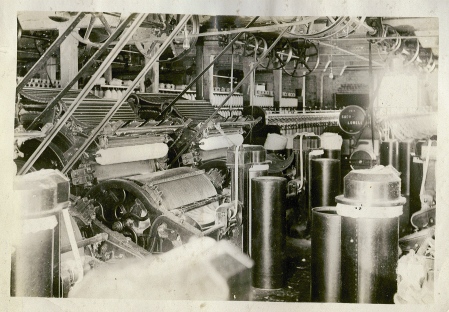
Card Room (1916).
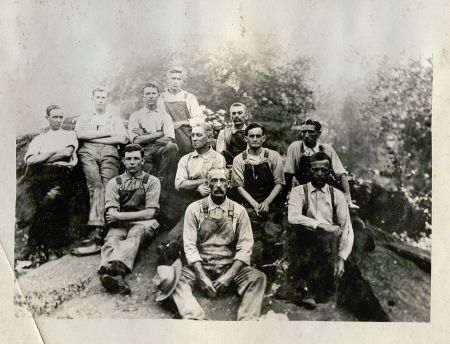
Card Room Hands (1916). James Buie sits in the center.
It was usual for children in a mill to start with the most menial jobs, such as sweeping up cotton dust and lint, or oiling the machinery. Older boys and girls could “doff,” or remove full bobbins of yarn from a spinning frame (while it was running) and load empty bobbins in their place. Such jobs gradually gave young employees knowledge of the various manufacturing operations, and they could be put to work in the specialized ‘rooms’ of equipment. The mill had a hierarchical structure, with sections of each room under the supervision of “Second Hands,” who reported to the Overseer or “Boss” of the Room, who reported to the Superintendent of the Factory; who reported to the owners and stockholders.
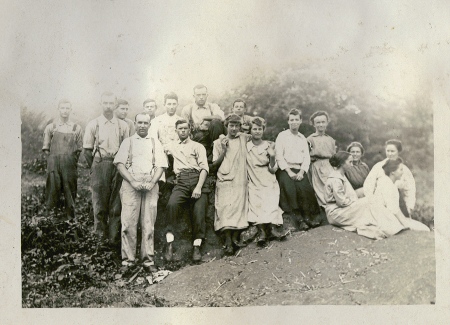
Weaving Room Hands (1916). Hugh Buie stands in left foreground.
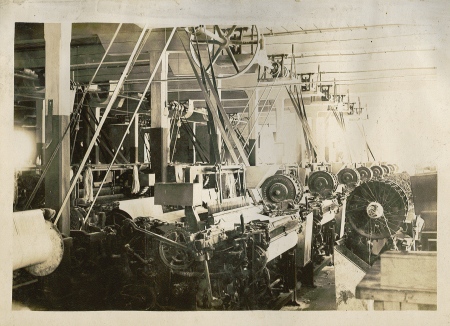
Weaving Room (1916).
It isn’t known what jobs the Buie children may have done in the Manchester factory, and the Franklinville employee records are fragmentary so far back, but it is clear that they grew up working in cotton mills, and became good at mill work. Jane and Lettie worked in the Weave Room; Catherine (known as Kate), Nancy (Nannie) and John Allen Buie never married, and lived together into the 20th century, all working standard wage jobs in the mills.
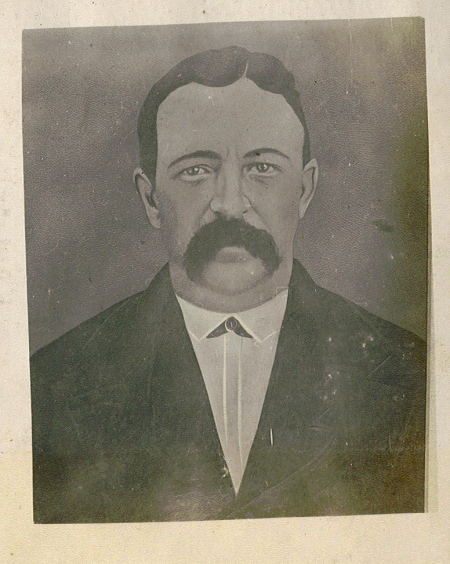
M.G. Buie
Overseer of Spinning, 1882-1883
Overseer of Weaving, 1882-1912
Died October 10, 1912
Their brothers William, James and Matthew Gilbert (“Gib”), however, all became higher level supervisors in various departments. The early career of William, the youngest brother, is not known but in 1900 he was listed as the “Boss Weaver” of the Lower Mill. He held that job for 55 years, indicating the stability and job security enjoyed by skilled technical workers in the early industry. His son Lacy Buie served as Chief Engineer of the factory at Cedar Falls, and other children worked in factories in High Point and Hamlet.

James Buie
Overseer of Spinning, 1877-1882.
Overseer of Carding, 1882-1923.
Died June 13, 1923.

James Buie House, 159 Rose St., Franklinville
In 1870 James was working in the mill as a machinist, but in 1877 at age 23 he was made Overseer of the Spinning Room at the Upper Mill; he transferred to the position of Overseer of the Card Room in 1882, a job he remained in for the next 43 years. When James went to the Card Room his brother Gib was made Overseer of Spinning, but he only held that job a year until he was made Overseer of the Weave Room, perhaps the most important supervisory position in the mill under that of Superintendent. Gib Buie served as “Boss Weaver” until 1916, when his son Hugh Buie took over that job. Hugh had been a loom fixer in the mill when he was promoted to Second Hand in the Weave Room in 1912. Hugh had tried jobs outside the mill- in 1903 he was running a store and livery stable in Franklinville- but obviously the pull of family connections in the mill brought him back into the dynastic structure of the factory. When he died in 1934, Hugh Buie was both Overseer of Weaving and Foreman of the Finishing Department.

Joe T. Buie
Book-Keeper, 1912-1923.
Gib Buie’s other children also had careers in the mill. His son Joe became the mill book-keeper and office manager; daughters Jane and Fannie worked as weavers, and Blanche and Mattie were Drawing-In Hands, hooking the warp yarns through the heddles and reeds to create weave patterns. Fannie left the mill to marry George Russell, then the Chief Engineer of the Upper Mill, and later its Superintendent.

Hugh B. Buie, Overseer of Weaving, 1912-1923.
Hugh Buie’s children included my friends Katherine, the original Franklinville Librarian, her sister Margaret, who married Clyde Williams and worked in the Company Store. Youngest son Mack Buie was working in the Lexington Silk Mill when he was drafted in 1942, and son Charles (1906-1960), began working in the Montgomery County mill town of Capelsie by the time he was eighteen years old. He became Superintendent of the Aileen Mills in the nearby town of Biscoe, and ultimately was President of Spring Mills there. His son Charles Jr. in 1967 opened Charlescraft, Inc.- originally making kitchen towels, dishcloths and potholders, but gradually diversifying into polyester and blended industrial yarns. Today the family-owned and operated company is one of the country’s best-known manufacturers of high-performance flame-resistant and cut-resistant yarns and fabrics, spinning Aramid fibers such as Kevlar and Nomex for commercial and military applications.
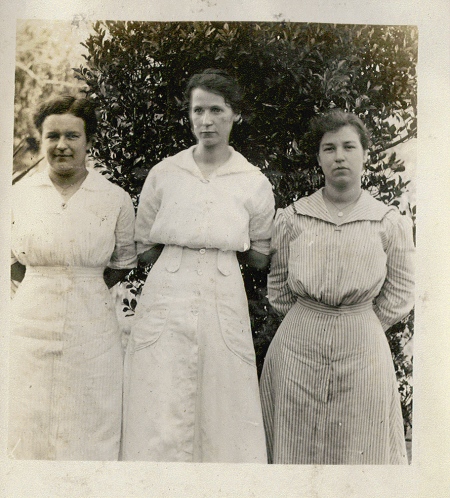
Drawing-In Hands (1916).
Miss Mattie Buie
Miss Ellie Martindill
Miss Blanche Buie.
So a North Carolina family which started to earn a living in textile trades in Cumberland County in the 1840s, then moved to Franklinville in the 1860s, has remained heavily involved in the state’s textile industry ever since. I’m not sure if there are other North Carolina families who can match this record of service, but certainly the Buie family of Franklinville can be proud of one of our longest traditions in the state’s textile industry.